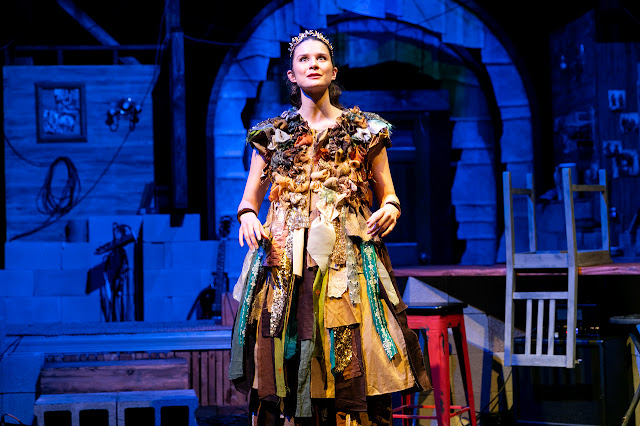Metra: A Climate Revolution Play with Songs
Written by Emily and Ned Hartford
Directed by Emily Hartford
Songs by Ned Hartford
466 Grand Street (at Pitt Street), Manhattan, NYC
October 28 - November 12, 2022
 |
| Metra featuring Rebecca Ana Peña. Photo credit: Isaiah Tanenbaum |
Anecdotes are not data, etc., etc., but having seen the climate apocalypse play Metra on a humid 75-degree November day certainly did nothing to contradict the urgency of its message. Metra, subtitled A Climate Revolution Play with Songs, looks back in order to look forward, drawing on Greek myth (via Ovid) to imagine paths to revolutionary action in a not-at-all-too-distant and all too plausible future dramatically shaped by climate-related factors such as severe heat, famine, water scarcity, and mass migration. While both that mythic past and imagined future are pretty grim, Metra ultimately advocates against despair, and it deploys an enlivening blend of humor, magic, and music to do so. |
| Metra featuring Rebecca Ana Peña, Cherrye J. Davis, and Corinna Schulenburg. Photo credit: Isaiah Tanenbaum |
Music, in fact,
is magic in
Metra since tree nymph Aglophonos (Rebecca Ana Peña) has the vocal powers of a siren. When Cori (Cherrye J. Davis), a successful young Black hedge fund owner, encounters Aglophonos, the nymph informs Cori that she has lived many lives and that her lineage of reincarnations can be traced back to the mythical Metra (how one can be both mythical and real ties into the play's larger concerns with the significance of telling and shaping stories). Metra's father, King Erysichthon, in Ovid's version of the story, destroys a sacred grove and is cursed with eternal hunger that eventually drives him to a grisly but symbolically apt end, a story that resembles Indigenous wendigo narratives in its caution against the selfish overconsumption of resources. Aglophonos, in reconnecting Cori with her past lives and so with a relationship to time, basically fast-forwards Cori from her present of 2015 three decades into the future (an echo, perhaps, of the way in which climate change keeps outstripping its predicted pace), giving us snatches along the way of how the world ends up as it does: with the wealthy elite living as "Bubble people" while the majority of human beings struggle for survival outside these settlements, which are enclosed and guarded with lethal force.
 |
| Metra featuring Richard B. Watson, Rebecca Ana Peña, Cherrye J. Davis, and Corinna Schulenburg. Photo credit: Isaiah Tanenbaum |
Aglophonos and Cori have a plan to bring down the Bubbles, and their first recruit is Sam (Corinna Schulenburg), a White trans woman and former journalist whom they view as their storyteller and who is the one who proposes using song to help win others to their cause. After several years of work–and some ethical disagreement about methods–billionaire Tyler Herzog (Richard B. Watson) ends up captured by the group on the eve of its big move, although one member of the group has deeper, more personal motives for this specific hijacking. Given the options to assist in the revolution or to continue to benefit from the same capitalist-engendered problems that he promises, as a philanthropist, to help solve, which will he choose? And, with or without Tyler's help, do the rebels have any chance of success?
 |
| Metra featuring Rebecca Ana Peña, Richard B. Watson, and Cherrye J. Davis. Photo credit: Isaiah Tanenbaum |
Metra posits the interrelation of individual and large-scale stories of transformation. The narrative of what scholar Jason Moore terms the Capitalocene, the era of capitalism's extraction and exploitation of both labor and natural resources, is a tale of transformation as well, albeit an apocalyptic one. This tale is one that the revolutionaries of
Metra would like to see replaced, along with the hierarchies of race and gender that capitalism helps to maintain, with a new story. The character of Tyler helps to assign responsibility to the elite and those in power rather than to the individual (or consumer, which amount to the same thing under capitalism) who is told that if everyone just changed their personal behavior enough, this whole thing would be solved without any of those pesky significant changes to the status quo and its one-way funneling of wealth and power. Any new story, though, as Cori says, must "be about the community."
Cori's journey from one-percenter to revolutionary is ably embodied by Davis, while Schulenburg lends the often-funny Sam an enthusiastic and endearing optimism. Watson is extremely charming as the greenwashing Tyler, and Peña brings a touch of otherworldliness and a powerful voice to Aglophonos. The cast also, in addition to showing off their vocal prowess, skillfully switches characters as various stories are recounted, personae adopted, masks donned, and magic employed (Watson, for instance, plays both a swaggering king and, in a very funny turn, Tyler's father). The songs are primarily backed by live guitar, and we'd love to see a staging in which they were arranged for a full band–after all, the setting in the protagonists' bar gives a good excuse for one.
 |
| Metra featuring Corinna Schulenburg and Richard B. Watson. Photo credit: Isaiah Tanenbaum |
This production of
Metra is a part of Stop the Money Pipeline coalition’s
Blame Wall Street Project; the show incorporates the work of Jem Pickard as its Climate Action Designer, and
Metra's program includes extensive information on possible actions. If
Metra took the place of something like
The Lion King on Broadway, we'd all be better off. But until then, you can make sure to see it at Abrons Arts Center.
-John R. Ziegler and Leah Richards








Comments
Post a Comment